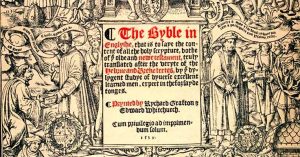
[Master of François de Rohan (fl. from 1525 until 1546), Title page from the Great Bible published by Grafton and Whitchurch in 1539—public domain, wikimedia File:GreatbibleI.jpg]
Ditchfield, in Books Fatal to their Authors, mentions several Bible translators who paid dearly for their efforts. One translator who escaped punishment by the skin of his teeth was Arias Montanus, who produced a Polyglot Bible at the command of King Philip II of Spain, but was denounced for it to the pope because he had strayed from the Latin Vulgate. Montanus pleaded his case in Rome where the pope eventually pardoned him. His work, however, was placed on the Index Expurgatorius to which he had, in his day, added others’ works.
In Italy, Antonio Bruccioli, who had a radical streak that often got him into trouble with authorities, was required to answer to the Inquisition for a Bible translation into the Tuscan dialect. Its notes favored Lutheranism. He was condemned to die by hanging but the intercession of friends got him banished instead.
Enzinas dedicated a Spanish translation of the New Testament to Emperor Charles V, but was imprisoned for his pains. Fifteen months later he escaped and fled to Geneva. De Sacy (Louis Le Maistre) was imprisoned in the Bastille, in part because of his Jansenist opinions (Jansenism was a Catholic reform movement that the pope eventually banned) but also for a French translation, the New Testament of Mons, widely condemned by Catholic authorities.
Printers did not escape either. Jacob van Liesvelt was beheaded in 1545 for printing the Bible into Dutch three years earlier with a woodcut that depicted the devil as a bearded monk with a rosary. Richard Grafton was imprisoned in England in 1543 for having printed the Great Bible (a portion of its title page is shown above).
